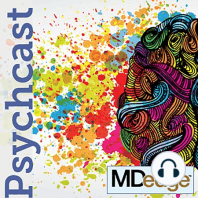17 min listen

TMS, ECT, and other device-based therapies for treating refractory major depression and bipolar depression with Dr. Philip Janicak
FromPsychcast
TMS, ECT, and other device-based therapies for treating refractory major depression and bipolar depression with Dr. Philip Janicak
FromPsychcast
ratings:
Length:
36 minutes
Released:
Jul 29, 2020
Format:
Podcast episode
Description
Episode 128 interview: Philip G. Janicak, MD, joins MDedge Psychiatry Editor in Chief Lorenzo Norris, MD, to discuss device-based therapies for psychiatric patients. Dr. Janicak is adjunct professor of psychiatry and behavioral sciences at Northwestern University in Chicago. He serves as an unpaid consultant to Neuronetics and has a financial relationship with Otsuka. Dr. Norris, medical director of psychiatric and behavioral services at George Washington University Hospital in Washington, has no disclosures. Take-home points Therapeutic neuromodulation, including electroconvulsive therapy (ECT) and transcranial magnetic stimulation (TMS), refers to the use of device-based therapies that alter neurocircuitry implicated in the pathophysiology of psychiatric disorders. Most available evidence is from studies in major depressive disorder, though more research is emerging for bipolar disorder and other diagnoses The advantage of TMS is minimal cognitive adverse effects, compared with ECT. Dr. Janicak recommends ECT over TMS when a patient requires inpatient psychiatric treatment, is acutely suicidal, has psychotic features, or is not taking care of basic needs. Summary TMS originated in England when Anthony T. Barker, PhD, began using TMS as a probe for the peripheral and central nervous systems. Imaging studies showed that, in the context of depression, the left dorsolateral prefrontal cortex had less metabolism and blood flow, and when TMS was applied, those phenomena were reversed. One large randomized, controlled trial showed that TMS treatment could lead to remission of depression and had a durable effect for most patients in the study. The recent goal of TMS research has been to improve the efficacy and decrease the length of treatment from 4-6 weeks of daily treatments to 1-2 weeks. In 2018, deep TMS (dTMS) was cleared by the Food and Drug Administration for the treatment of obsessive-compulsive disorder after first- and second-line pharmacologic and psychotherapeutic treatments. In dTMS, the medial prefrontal cortex and the anterior cingulate cortex are targeted. Several studies suggest the pro-cognitive effects of TMS, and Dr. Janicak hopes that TMS might be on the radar as treatment for mild cognitive impairment. TMS also is being used in combination with psychotherapy, such as cognitive-behavioral therapy, under the theory that TMS enhances the activity of the neurocircuitry and potentiates the effect of the psychotherapy. References Janicak PG. What’s new in transcranial magnetic stimulation. Current Psychiatry. 2019 Mar;18(3):10-6. Dunner DL et al. A multisite, naturalistic, observational study of transcranial magnetic stimulation for patients with pharmacoresistant major depressive disorder: Durability of benefit over a 1-year follow-up period. J Clin Psychiatry. 2014;75(12):1394-1401. Janicak PG and Dokucu ME. Transcranial magnetic stimulation for the treatment of major depression. Neuropsychiatr Dis Treat. 2015;11:1549-60. Vidrine R. Integrating deep transcranial stimulation into the OCD treatment algorithm. Psychiatric Times. 2020 Apr 7. Marra HLD et al. TMS in mild cognitive impairment. Behav Neurol. 2015;2015:287843. doi: 10.1155/2015/287843. Show notes by Jacqueline Posada, MD, who is associate producer of the Psychcast and consultation-liaison psychiatry fellow with the Inova Fairfax Hospital/George Washington University program in Falls Church, Va. Dr. Posada has no conflicts of interest. For more MDedge Podcasts, go to mdedge.com/podcasts Email the show: podcasts@mdedge.com
Released:
Jul 29, 2020
Format:
Podcast episode
Titles in the series (100)
Resilience part 3: The people right in front of us who show resilience by Psychcast